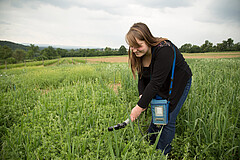On Campus AND digital:
Uni Hohenheim offers full & reliable range of courses [15.07.20]
University Senate decides on key points for the winter semester / Campus presence to be restored / Special offers for first-year students / Fallback option in case of a second Covid-19 wave
The University’s focus will once again be on campus - and yet, from the coming winter semester, the University of Hohenheim in Stuttgart will be offering a flexible course of study that also caters to the special needs of new students, risk groups, and international students and can be reliably implemented even if there is an increase in infections in the region. The basis for this is a paper of principles which was unanimously adopted by the Senate in yesterday's session. High-quality standards will be the focus: didactically, the University wants to optimize its offers. Text of the paper: www.uni-hohenheim.de/fileadmin/uni_hohenheim/Aktuelles/Corona-Krise/eckpunkte-wintersemester.pdf
The task was nearly impossible: In the key points for the coming winter semester, the Senate had to balance many different demands, take into account the special aspects of the risk of infection at universities compared with schools, for example, and create the possibility of reacting flexibly to changes in the infection situation at any time.
"We worked long and hard to work out this compromise and completed it last night," reported the President of the University of Hohenheim, Prof. Dr. Stephan Dabbert, at this morning's press conference.
The University is also motivated by its tradition of having been founded to combat crises. "At Hohenheim, we want to educate young people who will confidently confront the problems of humanity and help to change the world. The university must itself therefore be flexible, especially in extraordinary times."
High quality standards and offers for new students
The University of Hohenheim is particularly proud of the high quality of the courses on offer. "On campus AND digital means that we dovetail on-site courses and online offers," explained the Vice President for Academic Affairs, Prof. Dr. Korinna Huber.
"On campus, we will try to promote research-based learning, a culture of discussion, and the search for knowledge as far as possible in small groups, but we will also hold lectures to familiarize students with the classic university teaching style. After all, that is what makes a university unique. The digital offers will be focused on conveying facts and basic principles.”
This will also apply to the introductory week for first-year students from 26 October: "The President will greet the new university members via video conference. In small groups, they will then get to know each other personally on campus, and from the very start they will be immersed in research or get to know their degree programs," said Prof. Dr. Huber, reporting on current plans.
Her objective: "From day one, students should understand: Knowledge is fun! You learn to develop new ideas. You learn what you can do with your knowledge, and above all: You learn to recognize and solve problems!”
6-day week until 9 p.m., special consideration for specific groups
In order to make this possible, the Senate also decided on a bundle of possible organizational measures in the key issues paper:

On Campus AND digital: this is the core formula with which the University of Hohenheim intends to organize its winter semester. The small groups of students will have to keep the usual distance - unlike in this archive picture. Nevertheless, they should not have to do without on-campus courses - as in this student research project on the analysis of business negotiations within the framework of the Humboldt reloaded.
Picture source: University of Hohenheim / Astrid Untermann
- Extension of the lecture times from 7 a.m. to 9 p.m. on 6 days/week to allow as much small group work as possible on campus
- Priority for first-year students and practical courses such as seminars, laboratory work, etc.
- Flexible, asynchronous online services that allow for studies alongside family and other obligations, for members of risk groups, and for international students who are not allowed to enter the country
- Reliability and full value of the German and English online offers for almost all degree programs and semesters - even in case of further restrictions due to an increasing number of infections in the region
To overcome the particular challenge of organizing the many examinations, lecturers can replace written examinations in the lecture hall with other formats. The University of Hohenheim is also reviewing the possibility of using proctored exams, which can be taken online.
Another principle: Developing a system to document presence in lecture halls. The details can be found in the text here: https://www.uni-hohenheim.de/fileadmin/uni_hohenheim/Aktuelles/Corona-Krise/eckpunkte-wintersemester.pdf
Hygiene requirements at universities much more complex
In all its plans, the Senate had to take into account that the containment of infectious diseases is far more complex at universities than at any other educational institution. The approach taken by the University of Hohenheim to impart knowledge beyond the boundaries of the individual departments is now proving to be particularly challenging.
“Normally, we have 12,000 people on campus. Several hundred people from different semesters and degree programs can mix in one lecture. Two hours later, each of these people can meet up again with completely different fellow students. And because many of them come from all over the country, a considerable number travel halfway across the country on weekends," explained the President.
In the coming weeks, all lecture halls will be checked again in regard to hygiene, and the maximum number of persons will be determined for the current distance rules. "With a distance rule of 1.5 meters, we can admit about 100 people instead of the usual 600 into our largest lecture hall. After each course, we have to take a break for disinfecting the room. We cannot use poorly ventilated rooms at all."
Valuable attendance time should be used for the core of academic teaching
If all measures are effective, students will spend up to 25% of their usual time on site in personal exchange, estimated the President. But even this is "an average value that can vary greatly depending on the subject and semester," said Prof. Dr. Dabbert. "Distance and hygiene rules are decisive for how much on-campus teaching we can implement," stated the President.
However: "We want to make intensive use of this valuable on-campus time," announced Prof. Dr. Huber. "Last semester, we lecturers also learned a lot. We want to use this knowledge and develop it further."
In her own courses for first-year students, Prof. Dr. Huber wants to offer small groups of students on-campus courses to accompany the digital lectures. "They will receive the teaching content digitally as a transcript, as an animated PowerPoint lecture, or in other formats; learning progress checks on our platform for digital learning will also be included. When we meet, we will discuss relevant topics from animal production and derive research questions. This is how you learn to apply factual knowledge. After all, research-based learning is the most important thing for us. It is the foundation of the university and the heart of academic teaching. And that is what we want to offer - no matter the difficulties.”
A special tour de force requires savings to be made elsewhere
For the University, however, this passion for research and teaching also means a drain on resources: "Hygiene requirements are making everything more scarce: rooms, personnel, and money," said Prof. Dr. Dabbert. "These are resources we then lack elsewhere. The state's Covid-19 funds help, but they can only alleviate the shortage, not entirely compensate for it. We will have to reallocate resources and save elsewhere.”
On a personal level, too, this means a new and once again particular phase of stress for professors and, above all, for early career researchers. "Nevertheless, both lecturers and students are particularly dedicated in their efforts. The University of Hohenheim owes them special thanks for this," emphasized the President.

On Campus AND digital: In the coming winter semester at the University of Hohenheim there will again be face-to-face lectures in small groups and, above all, research-based learning - like in this research project on producing gluten-free beer from amaranth. However, depending on the restrictions imposed by the infection situation, it will also be possible to complete the semester in full with high-quality digital offers.
Picture source: University of Hohenheim

On Campus AND digital: In the coming winter semester at the University of Hohenheim there will again be face-to-face lectures in small groups and, above all, research-based learning - like in this analysis of a field experiment on clover seeds in organic farming. However, depending on the restrictions imposed by the infection situation, it will also be possible to complete the semester in full with high-quality digital offers.
Picture source: University of Hohenheim / Astrid Untermann

On Campus AND digital: In the coming winter semester at the University of Hohenheim there will again be face-to-face lectures in small groups and, above all, research-based learning - like in this research project on anti-oxidants in amaranth and quinoa. However, depending on the restrictions imposed by the infection situation, it will also be possible to complete the semester in full with high-quality digital offers.
Picture source: University of Hohenheim / Astrid Untermann
Text: Klebs





